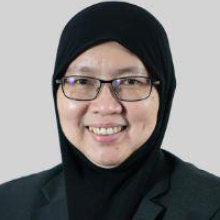
Titik Khawa Abd Rahman
Work place: School of Science and Technology, Asia e University, Selangor, 47500, Malaysia
E-mail: titik.khawa@aeu.edu.my
Website: https://orcid.org/0000-0002-7174-7625
Research Interests:
Biography
Titik Khawa Abd Rahman received a B.Sc. in Electrical and Electronics Engineering from Loughborough University of Technology, UK. She holds a PhD. in Power System, University of Malaya. She is the current Deputy Vice Chancellor of Asia e University. Her expertise includes artificial intelligence, biologically inspired optimisation, machine learning, power system analysis and operation, and smart grid.
Author Articles
Utilizing Machine Learning-Based Decision-Making to Align Higher Education Curriculum with Industry Requirements
By Muhammad Faisal Titik Khawa Abd Rahman Darniati Zainal Husni Mubarak Fadly Shabir Nizirwan Anwar Imam Asrowardi
DOI: https://doi.org/10.5815/ijmecs.2025.04.01, Pub. Date: 8 Aug. 2025
The accelerating pace of industrial transformation necessitates a strategic reconfiguration of higher education curriculum to ensure alignment with dynamic labour market demands. This study introduces a hybrid decision-making framework that integrates Machine Learning with Multi-Criteria Decision Making techniques to evaluate and classify the readiness and relevance of academic programs. The methodological core includes the Step-wise Weight Assessment Ratio Analysis, Linguistic q-Rung Orthopair Fuzzy Numbers, and the Multi-Attributive Border Approximation Area Comparison method for criteria weighting, coupled with a classification model based on Support Vector Machine optimized using the Salp Swarm Optimization algorithm. The results demonstrate the framework's efficacy in identifying curriculum gaps and recommending adaptive enhancements, especially for programs categorized as “Needs Improvement” Beyond classification, the system facilitates strategic curriculum planning, fosters pedagogical innovation, and promotes industry-responsive learning pathways. This study highlights the transformative potential of machine learning in higher education, equipping students with the skills required to navigate an increasingly dynamic professional landscape, while offering actionable insights into instructional redesign, competency-based delivery, and industry-informed pedagogy. Future research will explore longitudinal impact assessment and broader stakeholder integration to enhance the framework’s scalability and contextual adaptability.
[...] Read more.Other Articles
Subscribe to receive issue release notifications and newsletters from MECS Press journals